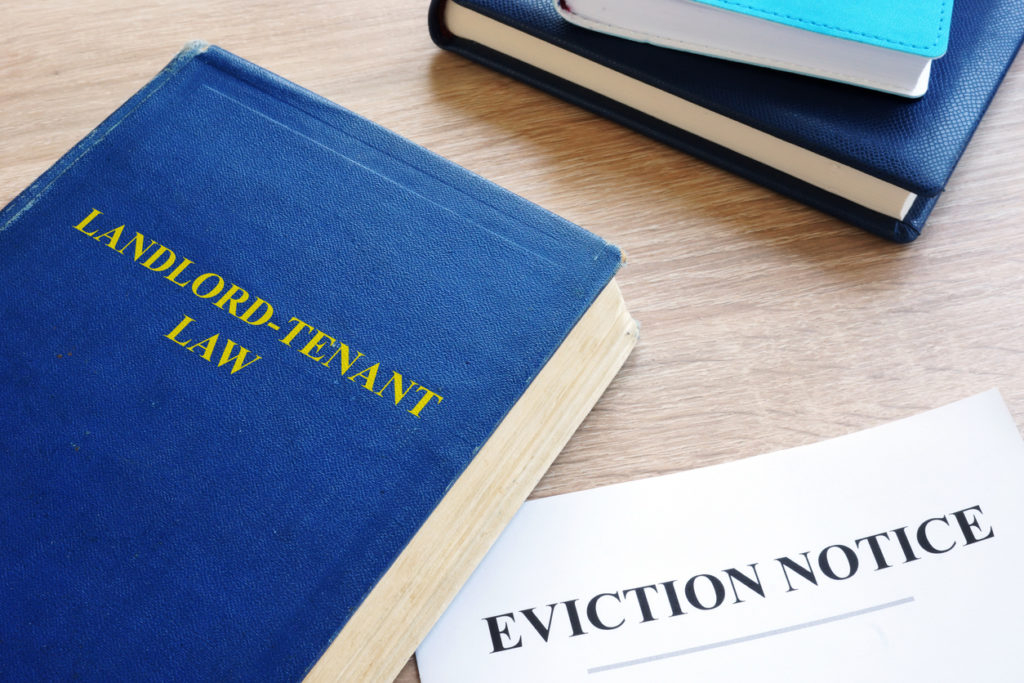
Knowing how to write an eviction notice is important when dealing with a problematic tenant. A legal process in which a landlord legally removes a tenant from a rental property, evictions can happen for a variety of reasons, including tenants not paying rent, being habitually late paying rent, using the property for illegal activities, or damaging the property. Regardless of the reason, you as the landlord must follow the proper steps in evicting a tenant.
Can I Evict a Tenant Without Going to Court?
As a landlord, you can’t evict a renter without first terminating their tenancy. Each state has specific requirements, which you must follow precisely, regarding how eviction papers and termination notices are written and presented to a tenant. This usually begins with sending an eviction notice, followed by a lawsuit to obtain a judgment that allows you to evict a tenant who doesn’t move out voluntarily. The first step is understanding under what circumstances you can start the eviction process.
What Constitutes Termination With Cause
While the terminology may vary from state to state, there are three basic kinds of termination notices:
- Pay Rent or Quit Notices: Typically used when the renter hasn’t paid rent. This notice gives the tenant a set number of days (usually three to five) to either pay rent or vacate the property (‘quit’).
- Cure or Quit Notices: Typically given after a renter violates a condition or term of the rental agreement or lease, such as making excessive noise or having a pet. This notice gives them a specific amount of time to correct, or ‘cure’ the infraction or vacate the property.
- Unconditional Quit Notice: This is the most serious of notices, ordering the renter to vacate the property with no opportunity to correct a rental agreement or lease violation or to pay rent. Generally, this type of notice is only allowed when the tenant repeatedly violates a rental agreement or lease clause, is habitually late with the rent, causes severe damage to the property, or engages in serious illegal activity like selling drugs on the property.
Some states don’t require landlords to provide a tenant the opportunity or time to pay past-due rent or resolve lease violations. In these states, Unconditional Quit Notices can be sent for transgressions where a Cure or Quit or Pay or Quit Notice would be sent in states considered to be more tenant-friendly.
Many times, even after a tenant has received a notice, the person won’t catch up on rent, resolve violations, or vacate the property. In this case, the landlord needs to start an unlawful detainer lawsuit, which involves properly serving the renter with a summons and complaint for eviction.
How to Write an Eviction Notice
Knowing how to write an eviction notice that is clear, concise, and professional can help make the process of evicting a renter proceed smoothly. Following these simple steps can help:
- Address all tenants named on the lease
The legal lease you signed when the tenants started their tenancy should have the names of all tenants living at the property. As a landlord, you can decide if you want to evict all or just some of the tenants. Some states require a landlord to evict all tenants at once. In this case, writing a new lease for the tenants you want to keep can help resolve this issue. - List the essential lease information
The eviction notice needs to include specific details about the property in question, including the complete address (street, unit number, city, and ZIP code) along with the date all parties signed the lease. - Identify the type of notice you are sending
Clearly state the reason for any notice you are sending to a tenant. In the case of an eviction notice, the first sentence should clearly state it’s an eviction notice, along with the date the renter is to vacate the property by.
Most states have specific rules on the number of days landlords must give tenants to vacate the premises, so make sure to check landlord/tenant advisory boards or consult with legal counsel to confirm how much notice you need to give. - State the reason for the eviction
Next, you need to state the reason(s) you are seeking to evict the tenant. Typical eviction reasons include not paying rent, intentional or substantial damage to the property, threats, or acts of violence towards other tenants or you as the landlord, excessive noise violations, or using the property for illegal activity.
Each reason listed needs to be expanded with detailed information. For example, if you are looking to evict a tenant for non-payment of rent, you must list each date the rent was missed, along with the total amount they owe and any applicable fees.
Make sure the reason(s) you are evicting are legitimate and legal in your area, keeping in mind you can’t evict a tenant because of their familial status, disability, sex, religion, skin color, national origin, or race. - Serve the Eviction Notice to the Tenant(s)
The last step is serving the eviction notice to the tenant. Usually, eviction notices can be placed on the premises or directly delivered to any adult tenant listed on the lease and living on the property. In some cases, depending on the state, a landlord may be required to serve an eviction notice in a specific way, such as by obtaining a court order or having local police post the eviction notice.
How Much Time Do Tenants Get to Move?
Even after serving an eviction notice and obtaining a court order to evict, you can’t just move the tenant and their things onto the sidewalk. You may need to give the judgment, usually along with a fee, to your local law enforcement who will deliver the judgment to the tenant. This will also state a date that the tenant is legally required to be off the premises, generally within 7-30 days, depending on local laws. If the tenant doesn’t leave, the local police can return on that date and escort them off your property.
Eviction should be considered as the last option, as it usually requires a great deal of time and money, often exceeding any lost profits. Prevention is always a better option, so let Zumper help you carefully screen applicants before you rent to them.



